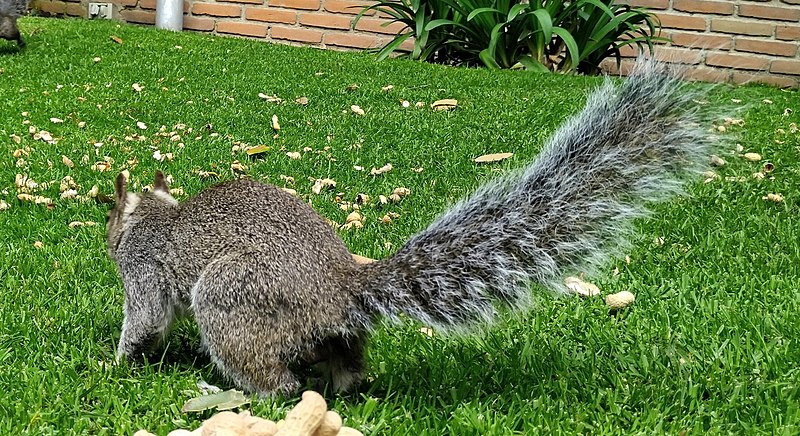“Squirrels despise strong scents like peppermint oil, garlic, and predator urine, which can effectively deter them.”
Squirrels may appear cute and harmless, but they can quickly become a nuisance when they invade your home or garden. Whether they’re digging up plants or chewing through wires, finding an effective way to keep them away is crucial. Fortunately, squirrels are sensitive to certain smells, sounds, and visual deterrents that can make your property less appealing to them. Understanding what squirrels hate most can help you protect your space without resorting to harmful methods.
In this article, we’ll explore the natural repellents that squirrels despise, including strong scents like peppermint oil and garlic, as well as deterrents such as reflective objects and ultrasonic devices. By using these simple techniques, you can create an environment that discourages squirrels from settling in, helping you manage the problem humanely and effectively.
Scents Squirrels Hate
Peppermint Oil
Peppermint oil is one of the most effective natural repellents for squirrels. The strong, minty aroma overwhelms their sensitive noses, making areas treated with peppermint oil unpleasant for them. Simply soaking cotton balls in peppermint oil and placing them near entry points or in areas where squirrels are active can drive them away. Additionally, using a spray bottle with a diluted peppermint oil solution can help cover larger areas like gardens or attics.
However, the effectiveness of peppermint oil depends on consistent reapplication. As the scent fades over time, especially outdoors where wind and rain can wash it away, it’s important to refresh the treatment regularly. This makes peppermint oil a great short-term solution, but it may need to be combined with other deterrents for long-lasting results.
Garlic
Garlic is another strong-smelling substance that squirrels find highly offensive. Crushed garlic cloves or garlic powder sprinkled around areas where squirrels are active can deter them from returning. The pungent smell of garlic masks the scent of food, which naturally draws squirrels away from the area in search of a more pleasant environment. You can even create a homemade spray by mixing crushed garlic with water and spraying it on plants or around your home.
Just like peppermint oil, garlic’s effectiveness relies on regular reapplication, as the scent can fade quickly. However, garlic is an easy and inexpensive deterrent that can be used in combination with other smells to strengthen your defense against squirrels. While it may not permanently solve the problem, it’s a useful tool in your pest control arsenal.
Coffee Grounds
Coffee grounds are commonly used as a natural deterrent for various pests, including squirrels. The strong, bitter smell of coffee disrupts squirrels’ ability to smell food or nesting areas, making the environment less attractive. Sprinkling used coffee grounds around gardens or entry points can help keep squirrels at bay without harming your plants. As a bonus, coffee grounds can also benefit your soil by adding nutrients like nitrogen.
However, coffee grounds aren’t a permanent fix, as the scent diminishes quickly, especially in rainy or windy conditions. For the best results, you’ll need to reapply the grounds frequently, especially after rain. While it’s an easy, eco-friendly option, it’s best to combine coffee grounds with other repellents for a more effective long-term strategy.
Predator Urine
Squirrels have a natural fear of predators, so using predator urine as a deterrent is another option. Products containing coyote, fox, or bobcat urine are available commercially and can be applied around the perimeter of your yard or near squirrel entry points. The scent of predator urine triggers the squirrel’s instinct to flee, as they perceive it as a threat to their safety. This method works particularly well in outdoor spaces like gardens, where squirrels are foraging for food.
The downside of using predator urine is that it needs to be reapplied frequently, especially after rainfall. While it’s an effective natural deterrent, it can also be somewhat unpleasant for homeowners due to the strong smell. Despite this, predator urine remains one of the more reliable ways to keep squirrels out of specific areas, especially when used alongside other scent-based repellents.
Visual and Sound Deterrents
Reflective Objects
Squirrels are naturally cautious animals, and they tend to avoid environments that appear threatening or unfamiliar. Reflective objects like CDs, aluminum foil, or specialized reflective tape can create visual disturbances that scare squirrels away. These items reflect light in unpredictable patterns, creating flashes that mimic movement, which startles squirrels and encourages them to avoid the area. Hanging reflective objects near gardens, bird feeders, or squirrel entry points can be an easy and cost-effective deterrent. While these objects may not fully eliminate squirrels, they serve as a useful tool in combination with other methods.
However, reflective objects are best used in outdoor spaces where sunlight can enhance their effect. In shaded areas or during cloudy days, their impact may be diminished, requiring alternative measures. Additionally, squirrels can become accustomed to reflective objects over time, which may reduce their effectiveness. Rotating or changing the position of reflective items periodically can help maintain their deterrent value. For the best results, consider combining reflective objects with sound-based deterrents to create a more unsettling environment for squirrels.
Ultrasonic Sound Devices
Ultrasonic sound devices are another popular method for keeping squirrels away, as these gadgets emit high-frequency sounds that are uncomfortable for squirrels but undetectable to humans. These devices are easy to set up and can be placed in attics, gardens, or any area where squirrels are known to be active. The constant noise creates an unpleasant environment for squirrels, encouraging them to leave in search of quieter surroundings. While ultrasonic devices can be effective, they are best suited for indoor use, where the sound is more contained and less likely to be disrupted by outside noise.
One drawback of ultrasonic sound devices is that their effectiveness can vary depending on the placement and the size of the affected area. In larger, open spaces, the sound may not be as concentrated, reducing its impact on squirrels. Additionally, like other deterrents, squirrels may adapt to the noise over time, making the devices less effective if used alone. For optimal results, ultrasonic sound devices should be used in conjunction with other deterrents, such as scent-based repellents or physical barriers. This multi-layered approach ensures a more comprehensive strategy for keeping squirrels at bay.
Conclusion
Squirrels can be persistent and difficult to deal with, but by using the right deterrents, you can protect your home and garden without causing harm to these animals. From strong scents like peppermint oil and garlic to reflective objects and ultrasonic devices, there are a variety of tools you can use to make your space less inviting to squirrels. However, these methods are most effective when combined and regularly maintained, ensuring that squirrels don’t adapt to the changes in their environment.
While DIY methods can help manage smaller squirrel problems, larger infestations may require professional assistance. AAAC Wildlife Removal Dallas specializes in humane, effective squirrel removal services tailored to your specific needs. Our team of experts is trained to handle even the most challenging infestations, using proven methods that protect both your home and the local wildlife.
If you’re struggling with squirrels and need a long-term solution, AAAC Wildlife Removal Dallas is here to help. We offer comprehensive squirrel removal services, from inspecting your home for entry points to safely removing the animals and sealing your property to prevent future issues. Contact us today to learn more about how we can assist with all your wildlife removal needs.
More about squirrels:
Is It legal To Relocate Squirrels In Texas?
How Do You Get Rid of Squirrels?
How Long Do Coffee Grounds Keep Squirrels Away?
How Much Does It Cost To Get Rid Of Squirrels?





